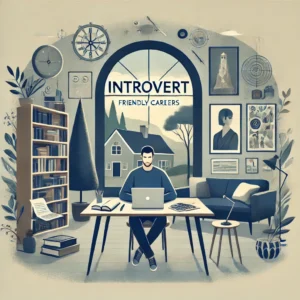Debunking Common Myths and Misconceptions About Introversion: The Truths
In a world that often celebrates
extroverted traits—outgoing personalities, social interactions,
and a preference for group activities—introversion
is frequently misunderstood.
Those who identify as introverts are often labeled
as shy, antisocial, or even unfriendly.
These stereotypes, however, are far from the truth.
Introversion is not a defect or a condition to be fixed;
rather, it is a natural and valuable personality trait
that comes with its own set of strengths and preferences.
Despite the growing awareness about personality differences,
introverts continue to be misunderstood and mischaracterized.
This article aims to debunk some of the most common myths
and misconceptions about introversion,
shedding light on the truths behind these falsehoods.

By understanding what introversion truly means,
we can appreciate the diversity of human personalities
and create a more inclusive environment for everyone,
regardless of where they fall
on the introversion-extroversion spectrum.
Myth 1: Introverts Are Shy
One of the most pervasive myths about introverts is that they are shy.
While some introverts may indeed be shy,
shyness and introversion are not the same thing.
Shyness is characterized by a fear of social judgment
or a lack of confidence in social situations.
Introversion, on the other hand, refers to how a person recharges
their energy and where they focus their attention.
Introverts tend to gain energy from solitary activities or small,
intimate gatherings,
while extroverts recharge by being around others.
Introverts may feel completely comfortable speaking in public,
leading a group, or engaging in social interactions,
but they may prefer to do so in a controlled,
low-stimulation environment.
The key difference is that, unlike extroverts,
introverts need time alone to recharge after social interactions,
not because they are shy,
but because their energy is depleted by too much external stimulation.
Myth 2: Introverts Don’t Like People
Another common misconception is that introverts don’t like
people or that they are antisocial.
This couldn’t be further from the truth.
Introverts value deep, meaningful connections
and often prefer quality over quantity when it comes to relationships.
They may not seek out large social gatherings
or enjoy small talk, but that doesn’t mean
they don’t enjoy spending time with others.
Introverts typically prefer to engage in conversations
that have depth and significance rather than superficial chit-chat.
They may also prefer spending time with a small group
of close friends or even one-on-one interactions.
The idea that introverts are aloof or indifferent to others’ company
is a myth; in reality,
they simply have different social needs and preferences.
Myth 3: Introverts Are Unfriendly or Rude
Because introverts may not be as outwardly expressive
or enthusiastic as their extroverted counterparts,
they are sometimes perceived as unfriendly or rude.
This misconception arises from the assumption
that everyone should behave in the same socially outgoing manner.
However, introverts often prefer
to observe before participating in conversations,
and they may take longer to warm up to new people
or situations.
This careful approach to social interactions is not a sign of rudeness
but rather a reflection of how
introverts process information and emotions.
Introverts tend to think before they speak
and may require more time to formulate their thoughts.
This thoughtful and deliberate communication style
can be misinterpreted as disinterest or aloofness,
but it is actually a strength that allows introverts
to contribute valuable insights once they are ready to share.
Myth 4: Introverts Don’t Make Good Leaders
The stereotype that introverts are not suited for leadership roles
is another myth that needs debunking.
While extroverted leaders may be more visible and vocal,
introverted leaders bring a different,
equally valuable set of skills to the table.
Introverts are often excellent listeners, thoughtful decision-makers,
and empathetic leaders who consider
the needs of their team members carefully.
Research has shown that introverted leaders
can be particularly effective in situations
where their teams are proactive and self-directed.
Introverted leaders are more likely to encourage their team members
to take initiative and express their ideas,
creating an environment where creativity
and innovation can flourish.
Rather than dominating the conversation,
introverted leaders excel at facilitating discussions
and ensuring that everyone’s voice is heard.
Myth 5: Introverts Can Become Extroverts
A common misconception is that introverts can—or
should—become extroverts through practice or effort.
While it is true that introverts can develop social skills
and adapt to different environments,
introversion is a fundamental aspect of their personality,
not a flaw that needs to be corrected.
Trying to force introverts to behave like extroverts can lead
to burnout, stress, and a diminished sense of self-worth.
Instead of trying to change their core nature,
introverts should be encouraged to embrace their strengths
and find ways to navigate the world that align with their personality.
This might mean seeking out environments
that are conducive to their preferences,
such as workplaces that offer flexibility
and quiet spaces for focused work.
It might also involve building social networks that respect
and appreciate their need for solitude.
Myth 6: Introverts Are Less Happy Than Extroverts
The idea that introverts are less happy than extroverts
is another myth that doesn’t hold up under scrutiny.
Happiness is subjective and can be experienced in different ways.
While extroverts might derive joy from social interactions
and external stimulation,
introverts often find happiness in solitary pursuits,
creative activities, or quiet reflection.
Introverts may not express their happiness as outwardly as extroverts,
but that doesn’t mean they are less content.
In fact, introverts often have a rich inner life,
with hobbies and interests that bring them deep satisfaction.
The key to happiness for introverts
is not trying to mimic extroverted behaviors
but rather finding balance and fulfillment in their own way.
Myth 7: Introverts Are Afraid of Public Speaking
Lastly, the belief that all introverts fear public speaking
is a widespread myth.
While public speaking can be challenging for anyone,
regardless of personality type, introverts are not inherently worse at it.
Many introverts are skilled communicators who,
when given the opportunity to prepare and practice,
can deliver powerful and effective speeches.
The difference lies in the preparation process.
Introverts often prefer to rehearse and plan
their speeches meticulously,
ensuring they are comfortable with the material.
They may also need more time to recharge
after public speaking engagements,
but this doesn’t mean they are incapable
of delivering a great presentation.
In conclusion, the myths and misconceptions surrounding introversion
do a disservice not only to introverts but also to society as a whole.
By recognizing and debunking these myths,
we can foster a more inclusive understanding
of different personality types and appreciate
the unique contributions that introverts bring to the table.
Introversion is not a limitation;
it is a powerful and valuable way of experiencing the world,
one that deserves to be understood and celebrated.






